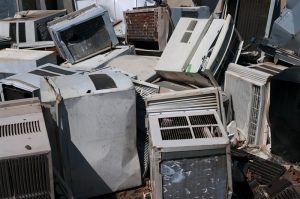 Corrosion is a major enemy of most metal devices and appliances. With air conditioners, corrosion along the evaporator or condenser coils is responsible for 40% of system failures. Corrosion can happen quickly and may result from years of moisture exposure.
Corrosion is a major enemy of most metal devices and appliances. With air conditioners, corrosion along the evaporator or condenser coils is responsible for 40% of system failures. Corrosion can happen quickly and may result from years of moisture exposure.
If you notice corrosion starting anywhere on your home’s cooling system, call for professional AC repair in Alachua, FL. The sooner you have the problem dealt with, the less likely you’ll need to replace the air conditioning system years before its time.
Why Corrosion Can Strike an Air Conditioner
The outdoor unit of an AC is exposed to the elements, and moisture—something Florida has in copious amounts—can trigger corrosion on the metal coils. The air conditioner cabinet protects most of the parts from direct exposure to water, but it’s not a perfect fortress. Water can get in through the grill of the unit.
There’s another, sneakier source of corrosion, and it can affect the indoor components of an AC: formaldehyde. This chemical causes a reaction in copper leading to formicary corrosion, a type of corrosion creating weak patches along copper. This is one of the leading causes of refrigerant leaks. Unfortunately, formaldehyde is present in most homes and is difficult to get rid of. Other chemicals present in homes, chloride and fluoride, may also trigger corrosion.
Finally, dogs can cause an AC to corrode. Yes, dogs. Dog urine is corrosive and can inflict fast damage to the outdoor unit coils. If you have dogs, make sure they only relieve themselves away from the AC cabinet. You may want to place a fence around the unit—just make sure the fence doesn’t prevent proper venting.
What Corrosion Does to an Air Conditioner
The biggest danger from corrosion on an air conditioner is loss of refrigerant. Corrosion eats away at the copper of refrigerant coils, allowing the high-pressure chemical to escape. Because an AC is built for a specific amount of refrigerant (known as the unit’s charge) any drop in refrigerant levels places the whole unit in danger. The air conditioner will lose cooling power, but that’s only the start. The indoor coil will freeze over and eventually the compressor will overheat and burn out. If the compressor fails, it’s usually best to replace the entire air conditioner rather than pay to replace only the compressor.
Corrosion also leads to a decline in the efficiency of the coils, since the corrosion creates an insulating layer against heat exchange. The air conditioner will become more expensive to run (around 10%), which is often one of the first warnings signs you have corrosion developing.
Repairs/Replacements for a Corroded AC
When corrosion sets in on the coils of an air conditioner, the best solution is to have technicians replace the coils. This is recommended if the AC is still relatively new (less than 10 years old) and the cost of the repair isn’t more than half the price tag of installing a new unit. For an older air conditioner or cases where the corrosion is extensive and creating refrigerant leaks, replacing the entire unit is a more cost-effective choice. Speak to our professionals about the best option for solving your corroded AC troubles.
